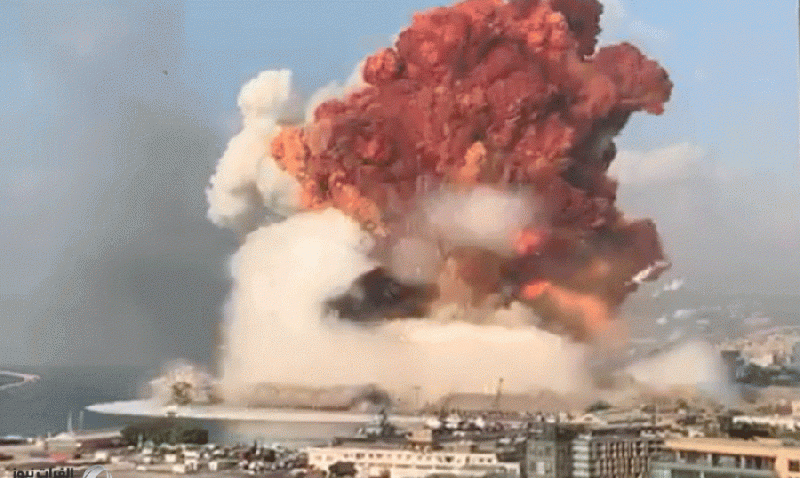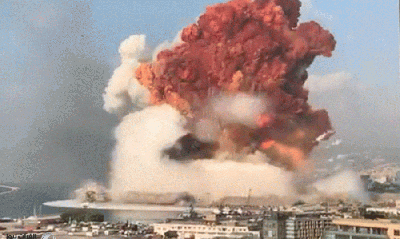The investigation into the Beirut port explosion enters a new phase following a decision by the President of the Court of Appeal in Beirut, Judge Habib Rizkallah, who requested the Public Prosecutor, Judge Ghassan Oueidat, to rectify the charges against the investigative judge in the Beirut port explosion case, Judge Tarek Bitar. This comes alongside a decision by the Public Prosecutor, Judge Sabouh Suleiman, to "suspend" the enforcement of an absentee arrest warrant issued against former Minister of Public Works and Transport, Youssef Finyanus, just days ago, similar to a prior procedure taken by Judge Imad Qablan regarding the recovery of an absentee arrest warrant against MP Ali Hassan Khalil, as reported by "Nidaa Al-Watan."
The decision by Judge Rizkallah, who is considering the allegations against Bitar by Oueidat for " impersonating a judicial investigator," aims to clarify the legal opinion relied upon by Bitar, which states there is no legal text permitting the removal of the investigative judge from his work. The appeal by Oueidat remains before a charge committee that has not yet been formed, thereby placing the file once again in "clinical death."
Families of the victims from August 4 stated in a release that the suspension of arrest warrants "continues the trend of overturning judicial procedures and undermining the simplest legal concepts," and it diminishes the investigation file after months of obstruction through excessive requests for recusal, followed by an illegal challenge to the powers of investigative judge Tarek Bitar by the Public Prosecutor. They emphasized their "support for the decision of the Prosecutor’s Office in the port explosion case to appeal the suspension of the arrest warrant against former Minister Youssef Finyanus."
Concurrently, lawyers Jad Tameh and Najeeb Farhat submitted a second alert petition to all original, assigned, and delegated heads of chambers of cassation, calling for the convening of the Public Authority of the Court of Cassation to address the lawsuits related to the recusal requests that have long impeded the work of the investigative judge in the port case. The next step, if there is no response to the request within the next ten days, will be to explore the possibility of filing a lawsuit against the state for the actions of its judges and their responsibility for failing to uphold justice, which must be submitted within the legally specified two-month period.
In response to the new judicial developments, a judicial source told "Nidaa Al-Watan" that "it is disgraceful to witness such absurdities in the judiciary," and that "the mutual allegations fall within the realm of a war of words, and there is no benefit in approaching them legally as they are futile." It was noted that the removal of investigative judge Tarek Bitar from the investigation is due to objections raised by involved parties that require a meeting of the Public Authority of the Court of Cassation to resolve them. The source viewed the conflict between Oueidat and Bitar as reflecting the struggle between "the hawks of the judiciary," before emphasizing that the decisions made by Judge Ghassan Oueidat after recusing himself as the Public Prosecutor from the investigation file constitute a clear violation of the law and carry a personal, rather than legal, nature that ceases with his departure, as Oueidat will reach the legal retirement age on February 21, 2024.
In light of these indicators, legal circles following the case suggest that the delay in appointing the charge committee reviewing the investigation with investigative judge Tarek Bitar—three judges appointed by the Supreme Judicial Council—may be due to differing views among council members. They emphasize that the complaint filed by Judge Oueidat against Judge Bitar "does not legally impede the continuation of investigative judge Bitar's work, despite the moral implications it has left." It was highlighted that the decision taken by President Rizkallah, based on valid reasons, keeps the door open for the investigative judge, who alone has the right to decide what is appropriate for his work, concluding by stating, "He originally had the right to continue the investigation."
It is also noteworthy that the postponement of all the interrogations set by investigative judge Tarek Bitar in February 2023 occurred after the Public Prosecutor's office decided not to recognize his subpoenas or to continue the investigations. Before leaving his office in the courthouse, he stated: "There are lawsuits against me for abuse of power that need to be resolved and investigated; if it is proven that I abused my power, I should be held accountable, and if the opposite is proven, the investigation should continue." Will the decision by President Rizkallah, along with the legal retirement of Public Prosecutor Ghassan Oueidat, pave the way for the investigation to continue? Will a newly appointed Public Prosecutor correct the decisions of his predecessor, preparing to resume the investigation and deliver justice, or at least issue an indicting decision in a case of such magnitude?




